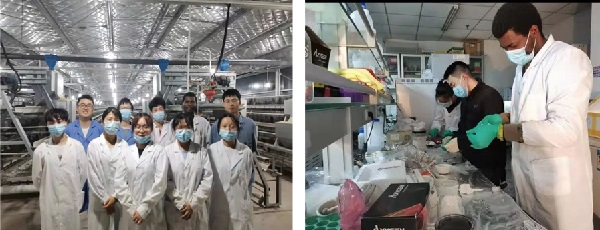
African Agriculture Transformation: Dr. Amevor Champions Nutritional Alternatives and Molecular Techniques in Poultry Farming
Dr. Felix Kwame Amevor, a distinguished Ghanaian poultry expert currently based in China, is spearheading a revolutionary approach to poultry farming in Africa.
In a recent interview, Dr. Amevor emphasized the need for a paradigm shift from antibiotics to nutritional alternatives and advanced molecular techniques to boost poultry productivity and sustainability across the continent.
Revolutionizing Poultry Health: Nutritional Alternatives
Dr. Amevor advocates for replacing antibiotics with dietary flavonoids and vitamins in poultry farming. This shift is aimed at addressing the pressing issue of antibiotic resistance and enhancing both animal and human health. His research underscores the advantages of these natural compounds:
• Flavonoids and Vitamins: In his study published in Frontiers in Immunology, titled “Supplementation of Dietary Quercetin and Vitamin E Promotes the Intestinal Structure and Immune Barrier Integrity in Aged Breeder Hens,’’ Dr. Amevor found that quercetin and vitamin E effectively improved intestinal function in aging breeder hens, by protecting the intestinal structure and integrity, and hence, could be used as an anti-aging agent to promote the physiological functions of the small intestine in chickens.
• Another study, published in Poultry Science under the title “Synergistic Effects of Quercetin and Vitamin E on Egg Production, Egg Quality, and Immunity in Aging Breeder Hens,” highlighted how this combination enhances egg production, quality, and immune function in aging hens.
• In a study titled “Dietary Supplementation of Salidroside Alleviates Liver Lipid Metabolism Disorder and Inflammatory Response to Promote Hepatocyte Regeneration via PI3K/AKT/Gsk3-β Pathway,” published in Poultry Science, Dr. Amevor investigated the effects of salidroside on fatty liver hemorrhagic syndrome in chickens.
Dr. Amevor's findings suggest that integrating these compounds into poultry diets not only promotes better health but also improves meat quality, providing a healthier product for consumers. Additionally, reducing reliance on antibiotics can lower production costs and align with international food safety standards.
Harnessing Molecular Techniques: A New Frontier
Dr. Amevor also advocates for the adoption of molecular techniques and innovative approaches to improve the genetic traits of chicken to increase productivity, disease resistance, and adaptability to changing environmental conditions. These techniques offer targeted solutions for enhancing poultry health and productivity:
• Biomarker Research: By leveraging on advanced molecular biology tools such as multi-omics, Dr. Amevor have made significant strides in his study published in Frontiers in Microbiology, titled ‘‘Synergy of Dietary Quercetin and Vitamin E Improves Cecal Microbiota and Its Metabolite Profile in Aged Breeder Hens’’ by identifying and utilizing cecal microbial biomarkers, metabolites, and candidate genes associated with growth performance, laying rate, and immunity in aging hens. These have enhanced the genetic quality and reproductive efficiency of aging laying hens, thereby contributing to food security and economic growth.
• Another relevant study by Dr. Amevor, ‘‘Integrated Proteomic and Metabolomic Analyses of Chicken Ovary Revealed the Crucial Role of Lipoprotein Lipase on Lipid Metabolism and Steroidogenesis During Sexual Maturity’’ also published in Frontiers in Physiology, shows that integrated proteomic and metabolomic analyses revealed that the upregulation of lipoprotein lipase in chicken ovary during sexual maturity promoted lipid metabolism and steroidogenesis of granulosa cell. He indicated that this study provided a theoretical basis for further studies on the mechanisms of lipid metabolism in avian granulosa cells during chicken sexual maturity.
Dr. Amevor argues that these molecular techniques can significantly help to improve disease resistance and growth rates in poultry, offering a more precise approach compared to traditional methods.
A Call to Action for African Governments
Dr. Amevor is calling on African governments to invest in research, support the development of molecular techniques, and provide comprehensive training for poultry farmers. He emphasizes three key areas:
• Research Investment: Allocate funding to research institutions to advance these innovative techniques.
• Farmer Training: Develop training programs to equip poultry breeders with the knowledge and skills needed to implement these alternatives effectively.
• Policy Development: Establish supportive policies and regulatory frameworks to facilitate the adoption of these innovations and ensure resource accessibility.
By embracing these recommendations, Dr. Amevor believes that African governments can transform the poultry industry, enhance productivity, and contribute to food security and economic growth. His advocacy points to a future where Africa leads in modern poultry farming through sustainable and scientifically advanced practices.
In conclusion, Dr. Amevor’s research and recommendations provide a strategic framework for advancing poultry farming in Africa. His work highlights the importance of integrating cutting-edge science with practical solutions to overcome the industry’s challenges and foster a more resilient and productive poultry sector.
